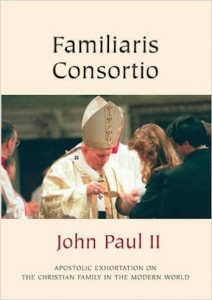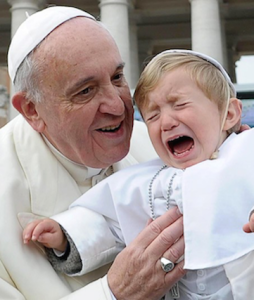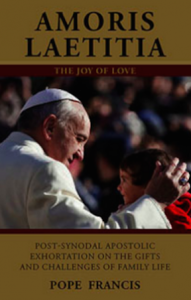The perennial discipline of the Catholic Church on the admissibility to Holy Communion of divorced and civilly remarried Catholics living in adulterous, or irregular, second unions was succinctly spelled out by St. John Paul II in Familiaris Consortio: “[T]he Church reaffirms her practice, which is based upon Sacred Scripture, of not admitting to Eucharistic Communion divorced persons who have remarried. They are unable to be admitted thereto from the fact that their state and condition of life objectively contradict that union of love between Christ and the Church which is signified and effected by the Eucharist. Besides this, there is another special pastoral reason: if these people were admitted to the Eucharist, the faithful would be led into error and confusion regarding the Church’s teaching about the indissolubility of marriage.” [84]
This discipline was reaffirmed in 1994 in a Letter to the Bishops of the Catholic Church concerning the Reception of Holy Communion by the Divorced and Remarried Members of the Faithful by the Congregation for the Doctrine of the Faith, which was specifically approved by St. John Paul II: “In fidelity to the words of Jesus Christ, the Church affirms that a new union cannot be recognised as valid if the preceding marriage was valid. If the divorced are remarried civilly, they find themselves in a situation that objectively contravenes God’s law. Consequently, they cannot receive Holy Communion as long as this situation persists.” [4]
The Pontifical Council for Legislative Texts issued a Declaration in 2000 on the same question: “In effect, the reception of the Body of Christ when one is publicly unworthy constitutes an objective harm to the ecclesial communion: it is a behavior that affects the rights of the Church and of all the faithful to live in accord with the exigencies of that communion. In the concrete case of the admission to Holy Communion of faithful who are divorced and remarried, the scandal, understood as an action that prompts others towards wrongdoing, affects at the same time both the sacrament of the Eucharist and the indissolubility of marriage. That scandal exists even if such behavior, unfortunately, no longer arouses surprise: in fact it is precisely with respect to the deformation of the conscience that it becomes more necessary for Pastors to act, with as much patience as firmness, as a protection to the sanctity of the Sacraments and a defense of Christian morality, and for the correct formation of the faithful.”[1]
The publication of Amoris Laetitia brought an end to this discipline. Now, the Church’s help and accompaniment of people publicly known to be living in “an objective state of sin” [305] has changed, as set forth in footnote 351 (and somewhat obscurely in footnote 336): “In certain cases, this can include the help of the sacraments.” The footnote refers to two statements Pope Francis made previously encouraging pastors to act with mildness and wide latitude when administering the sacraments of penance and the Holy Eucharist.
It’s strange that such a momentous change is effected in two footnotes, but much stranger is the change itself, which is manifestly a contradiction of the previous discipline. It makes no real difference that Holy Communion will now be given in “only certain cases” of adulterous second unions. Once some people living in adultery are allowed to receive the Holy Eucharist, while continuing to commit acts of adultery, the principles that upheld the previous discipline have been undermined. We are about to see creative ways in which the gravity of adultery and the obligation of Christians to conform their lives to the demands of the Gospel [102] will be minimized, if not largely denied, in matters related to the 6th Commandment.
AL grounds this change thus: “The Church possesses a solid body of refection concerning mitigating factors and situations. Hence, it can no longer simply be said that all those in any “irregular” situation are living in a state of mortal sin and are deprived of sanctifying grace. More is involved than mere ignorance of the rule. A subject may full well know the rule, yet have great difficulty in understanding ‘its inherent values’, or be in a concrete situation which does not allow him or her to act differently and decide otherwise without further sin.” [301, emphasis added]
Why the scare quotes around “irregular”? Scare quotes function as a substitute for the words “so-called” or “alleged.” Is the situation really irregular or only “irregular”? Is adultery a mortal sin or a “mortal” sin? Is it now incorrect to simply call a publicly known and persisting adulterous relationship irregular? Must one say that it is, you know, sort of, kind of, maybe in some way “irregular”? Then of course you can’t assume that any particular case of adultery is in fact a serious sin. It may only be a “mortal” sin. If the adulterous union is not in itself objectively irregular, but only “irregular,” then we don’t need to get into mitigating factors.
Further questions: Is it necessary to understand the “inherent values” of the 6th Commandment before one becomes obliged to obey it? Is it not sufficient to know that God wants us to avoid certain behaviors? How can we speak of “a concrete situation which does not allow him or her to act differently” without denying the freedom God has given us to decide what we will do any in given concrete situation? How can it be a “further sin” to stop sinning by refraining from acts of adultery?
The denial of Holy Communion to public sinners (canon 915) made up of those in adulterous second unions is not a legal determination that all such people are subjectively in mortal sin, but rather that the public adulterous state of such persons objectively and seriously contravenes God’s law. To ignore objectively wrong behavior that is a matter of public knowledge, and allow such persons to receive Holy Communion would create a situation in which “the faithful would be led into error and confusion regarding the Church’s teaching about the indissolubility of marriage.”
That “error and confusion” would consist in people wrongly thinking that the Church no longer considers adultery to be a mortal sin, or that it is possible to live in a relationship in which one habitually commits mortal sins and still have the right to receive Holy Communion. The canonical prohibition of Holy Communion for those “who obstinately persist in manifest grave sin” (canon 915) is based on a reasonable presumption that a public sinner is not completely ignorant of his Catholic Faith and has sufficient knowledge that his behavior violates what the Church teaches to be God’s law.
It further presumes that someone who acts freely and without coercion is responsible for his sin. In the case of someone who freely violates the 6th Commandment and his marriage vows, it is difficult, if not impossible, to claim he does not know that his second union is an offense against both God and his wife, or that he is somehow not culpable for his sins.
The general presumption may be set aside if appearances do not correspond to the actual state of things, as in the case of those who refrain from adulterous behavior and live as brother and sister. They may receive Holy Communion, as long as scandal is avoided as far as possible. But those who persist in living in sin even after being reminded of the Lord’s words regarding divorce and remarriage cannot be presumed to be innocent of mortal sin.
For a pastor to embrace this presumption in his advice to such persons would be dangerous to their spiritual welfare as it would tend towards fostering complacency rather than conversion. The sinner would be, as it were, “excused” in advance, rather than rebuked and admonished.
Here we arrive at a signal difficulty in AL Chapter 8: “Naturally, every effort should be made to encourage the development of an enlightened conscience, formed and guided by the responsible and serious discernment of one’s pastor, and to encourage an ever greater trust in God’s grace. Yet conscience can do more than recognize that a given situation does not correspond objectively to the overall demands of the Gospel. It can also recognize with sincerity and honesty what for now is the most generous response which can be given to God, and come to see with a certain moral security that it is what God himself is asking amid the concrete complexity of one’s limits, while yet not fully the objective ideal.”[308 emphasis added]
The primary duty of Christian conscience is to come to know what God asks of us, and then conform our thoughts and behavior to that. A “given situation” is not in question when analyzing one’s moral responsibility, but one’s freely chosen acts in that given situation.
It’s impossible that someone who is even minimally instructed in the “overall demands of the Gospel” by his pastor – and thus understands that the commandment “Thou shalt not commit adultery” applies to everyone without exception – could then decide that to continue committing acts of adultery “is the most generous response” to God that he can make “for now” as a Christian.
It’s likewise impossible that he could in all honesty “come to see with a certain moral security” that his decision to continue in an active adulterous relationship “is what God himself is asking amid the concrete complexity of one’s limits.” He might want to think that, but his pastor has a duty to persuade him of a serious error, not confirm him in a false, self-exculpatory fatalism that says he cannot do any better than keep on sinning, and that God wants it that way.
“It is reductive simply to consider whether or not an individual’s actions correspond to a general law or rule, because that is not enough to discern and ensure full fidelity to God in the concrete life of a human being.” [304] That may be true of a merely ecclesiastical law of minor importance. In the case of a law directly revealed by God, full fidelity is only achieved by obeying that law. Challenging a sinner to repent and conform his life to the Gospel, then, is the highest form of charity because it directs him into the path of life and away from something that gravely harms his relationship with God.
The priest who speaks with a man who confesses that he is in an invalid second union must patiently but firmly call him to repent and turn away from sin. If the priest is faithful to that charge, he will inform the divorced and remarried man that he is committing adultery every time he has sexual relations with a woman to whom he is not validly married. That this a Divine law that cannot be changed by the Church; that this is a mortal sin, and that the good of his soul and of the soul of the woman he is involved with demands that he stop committing mortal sins. And that just as he freely chose to begin the adulterous activity, he should freely end it. The power of God’s grace is present to strengthen this good resolve.
There can be no real purpose of amendment regarding the avoidance of future adulterous acts when the penitent does not commit to removing (or at least to trying to remove) himself from the situation that leads to those acts, as for instance in the case where the couple stays together for the good of their children, but lives as brother and sister. If the penitent plainly intends to continue to cohabit more uxorio with a woman he is not validly married to, then there is no purpose of amendment, but rather a rejection of the Lord’s word.
Some have suggested that it is a mistake to say that Pope Francis has changed the discipline of the Church, and that the discipline in effect on April 7th was still in force on April 8th. But the Synod Father invited by the Holy See to officially present the document, Cardinal Christoph Schönborn, said on that occasion: “the pope affirms in a note [351] that the help of the sacraments may also be given ‘in certain cases.’” Did he misunderstand the pope? Did the Synod office fail to vet his remarks? Hardly. It published the remarks in written form. The media essentially reported this story in the exact same sense.
On Saturday, April 9th Pope Francis did not send out his spokesman, Fr. Federico Lombardi, to correct the record and state that his intention was not in any way to contradict Familiaris Consortio 84 or the 1994 CDF Letter approved by St. John Paul II. He has sent out Fr. Lombardi on less momentous matters, such as a report alleging the pope’s poor health.
Some have argued that AL is not an act of the Papal Magisterium. Pope Francis says there: “I would make it clear that not all discussions of doctrinal, moral or pastoral issues need to be settled by interventions of the magisterium. Unity of teaching and practice is certainly necessary in the Church, but this does not preclude various ways of interpreting some aspects of that teaching or drawing certain consequences from it.” [3] He does not say here that this long exhortation is a private act reflecting his private opinions. Clearly, as pope, he introduces a radical change in sacramental practice, which he sees to be simply a “way of interpreting” or “drawing certain consequences.”
It’s regrettable. The new “interpretation” will have far reaching consequences and will produce much sorrow and division in the life of the Church.



















